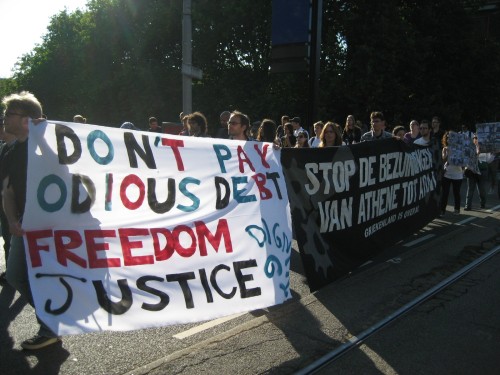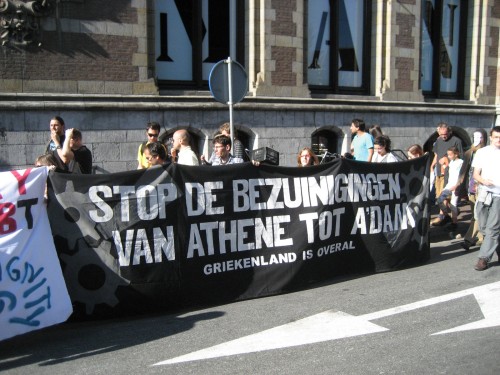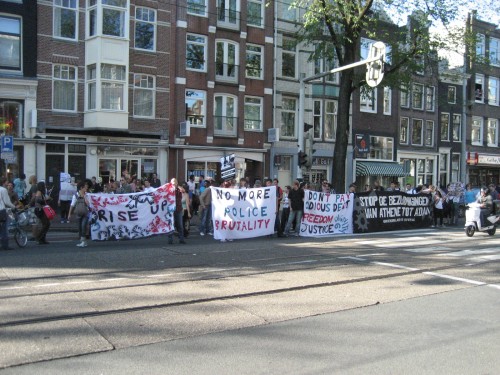republished from REinFORM.nl
Thursday 22 of March Minister Giannitsis was invited to talk about “growth after reform” by the Greek embassy and the Clingendael institute in the Hague.
Greeks living in the Netherlands made an intervention exposing lies and inaccurate information during his speech. It was made clear that the nature of reforms and measures for the so called growth is nothing more than the same neoliberal recipes that have been applied to many countries around the world.
At some point Giannitsis responding to the intervention he admitted that all enforced policies so far have spectacularly failed.
He told that the taxation system of Greece is unfair and in favor of the rich.
He agreed that the social cost is unbearable.
And although he has been a member of the government that had applied those measures he tried to distance himself from the policies of PASOK .
The event ended with the comment of the Director EU studies, A. Schout, that the people of all EU countries will soon feel the pain of the same austerity policies.
The following text summarizes the main points of the intervention and was distributed to the attendees
After reform comes growth
or the operation was successful but the patient diedWhat is ‘reform’ in Greece:
Reform in Greece means the impoverishment of the people that had nothing to do with the crisis. The unemployment reached 21% and 51% for young people. Salaries have been reduced to the levels of the social assistance in the Netherlands: the new minimum salary amounts to €467 a newly-hired teacher receives €560 per month. People cannot make ends meet: the unemployment benefit amounts to €359, while it expires after 12 months and no social assistance benefit exists. More than 20,000 homeless live in the streets of Athens. 200,000 people escape hunger by joining the daily common meals of the church (this number does not include the tens of thousands that depend on the common meals of municipalities and other organizations), while the ministry of education has started providing food to poor school children that faint at school due to hunger. Hundreds of thousands of people cannot pay their electricity or heating bills.
Reform means also that people cannot access public goods: 1,000 schools and 330 hospital clinics have already closed. This is only the beginning: according to the plans of the Troika, 150,000 civil servants will be laid off until 2015.
Growth of profits was the target…
While the German and Dutch media were hammering on the ‘lazy’ Greeks that ‘live beyond their potential’, the consecutive bail-outs along with the EU-IMF-reform initiated a large-scale income redistribution in favour of the banks and the multinationals. While financially-healthy Greek pension funds will see their funds vanishing, Greek banks will receive €48 billion to compensate for the debt restructuring. State-owned companies are privatized in prices well below what neoliberal economists would call the ‘market price’. To give an example: recently 10% of the Greek Telecommunication Agency (OTE) was sold to Deutsche Telecom for €400 million. In 2009, 30% of the same company was sold to the same buyer for €3.8 billion… While regressive taxation leads people to the edge, ship-owners are exempted from taxation and the effective taxation of gross revenues of Greek companies (those that are not located in the tax-heaven of the Netherlands to avoid taxation…) amounts to 7.6%.
To those that suggest that low taxation of the rich leads to investments, we remind that since the introduction of the euro €600 billion owned by rich Greeks have fled to Switzerland are remain untouchable by the Troika…
…and more of this growth
The recipe of the Troika and the puppet-government of the banker Papademos is well-known from it’s disastrous implementation in other parts of the world. People experienced it in countries such as Argentina, Chile, Equador, Latvia. It is a growth of profits of the 1% at the expense of the 99%. It is a growth of fast-truck investments that destroy the environment and the cultural heritage of countries. It is the growth of Special Economic Zones where people are forced to work in medieval conditions.
When the first austerity measures were applied in 2010, the government of mr Giannitsis and the Troika promised ‘growth’ for 2011. Instead of growth, the Greek economy landed to a deeper recession: the GDP contracted with 6% and it is expected to contract even more in 2012. Tens of thousands of companies closed, producing hundreds of thousands of unemployed. As in all countries that the same IMF-recipe was applied, the policy of ‘internal devaluation’ resulted into misery for the people and huge profits for the elite.
REinFORM





